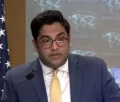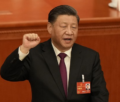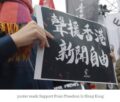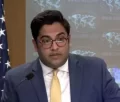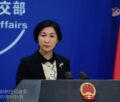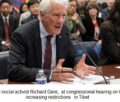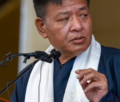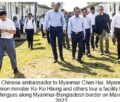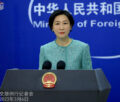China’s Central Asia pledges made with eye on both US and Moscow: Analysts

China has pledged to boost energy and security ties with Kazakhstan, while aiming for greater strategic coordination with Central Asia on the Ukraine crisis, in yet another push from Beijing to counter US influence, says a report in South China Morning Post (SCMP).
The pledges from Chinese Foreign Minister Wang Yi came as he met Kazakh president Kassym-Jomart Tokayev in the capital Nur-Sultan on Tuesday, followed by separate meetings with his counterparts from Kyrgyzstan, Turkmenistan and Uzbekistan.
Wang, who began a four-day tour to Kazakhstan on Monday, is also expected to attend a group meeting with the foreign ministers of the five Central Asian nations, all former Soviet republics – the fifth being Tajikistan.
Wang’s visit comes a few months after US Secretary of State Antony Blinken’s virtual meeting with Central Asian diplomats in late February.
His trip is likely to pave the way for Chinese President Xi Jinping’s expected state visit to Kazakhstan – a key Moscow ally- in September, followed by the Shanghai Cooperation Organisation summit in Uzbekistan, in what is likely to be the first time China’s top leader would leave the country since a visit to Myanmar in January 2020, the media report says quoting Observers.
Wang lavished praise on Kazakhstan during his meeting with Tokayev, describing the country as “a friendly neighbour and permanent comprehensive strategic partner”, while promising to increase Chinese investment there.
Since Xi launched the Belt and Road Initiative in the Kazakh capital, formerly known as Astana, nine years ago, China has become the country’s main trade partner and investor, while Kazakhstan remains a key energy supplier for the Chinese.
Russia’s military assault on Ukraine was also high on Wang’s agenda, with Xinhua reporting both Wang and Tokayev “expressed deep concerns about the serious spillover impacts” of the war.
China has so far refused to condemn Moscow for its aggression, though Wang claimed Beijing had played “a constructive role in promoting peace talks”.
He also called on the region to “be on guard against attempts by outside forces to draw regional countries into major power conflicts and force them to pick sides.”
Seeking to dispel concerns in the West and even among Central Asian nations about Beijing’s expanding economic clout, Wang said: “China has never sought geopolitical interests in Central Asia, and never allows extraterritorial forces to disrupt the region.”
Tokayev pledged “to maintain close and timely communication with the Chinese side, and unswervingly adhere to the settlement of disputes through peaceful means”, Xinhua reported.
He also promised to prioritise China in foreign policy and renewed Kazakhstan’s support for the belt and road, acknowledging that “China’s support and cooperation play a vital role in Kazakhstan’s political security, national stability and economic development.”
Wang sought to shore up support for the belt and road during his meetings with the foreign ministers of Kyrgyzstan, Turkmenistan and Uzbekistan as well, as Beijing’s strategy is tested by a worsening economic slowdown amid a lingering Covid-19 crisis.
He also touched on the security situation in Afghanistan following the chaotic US troop withdrawal last year and – in a veiled swipe at the US – called on Central Asian nations to resist attempts to destabilise the region.
This comes amid rising anti-Chinese sentiments across the region despite China’s increased investments and close political exchanges, with large public protests breaking out in Kazakhstan, Kyrgyzstan and Tajikistan over Beijing’s alleged mistreatment of Uygur Muslims in Xinjiang.
According to surveys by the Central Asian Barometer NGO, public perceptions in Kazakhstan, Uzbekistan, and Kyrgyzstan became increasingly unfavourable towards Beijing between 2017 and last year.
According to Wang Dehua, an expert on South and Central Asian affairs at the Shanghai Municipal Centre for International Studies, the Chinese diplomat’s Central Asia visit underlined Beijing’s recognition of the region’s significance in the US-China rivalry, especially against the backdrop of the war in Ukraine.
“As Beijing’s priority is to counter the US diplomatic offensive in the Asia-Pacific, Central Asia has gained prominence for China in geostrategic terms, especially after Washington’s military withdrawal from Afghanistan,” he said.
It is in China’s interests to secure the stability of Central Asia, Wang noted. “In a sense, Central Asia is the backyard for both China and Russia. While the US is wary of China’s growing influence, especially in the wake of the Ukraine war, Beijing’s efforts to rally support from Central Asia could also be seen as helping an embattled Moscow,” he said.
Another regional affairs analyst who declined to be named also said Wang’s visit was clearly aimed at the US, as both Beijing and Washington celebrated the 30-year anniversaries of their official ties with Central Asia nations.
“Xi’s scheduled visit, announced by the Kazakh media, may help substantiate China’s strategic ties with Central Asia because of their similar stance on Russia and their shared needs to ensure food and energy security and protect those investment projects from terrorism and the protracted war,” the analyst said, according to SCMP report.
……………………
-
Book Shelf
-
 Book Review
DESTINY OF A DYSFUNCTIONAL NUCLEAR STATE
Book Review
DESTINY OF A DYSFUNCTIONAL NUCLEAR STATE
- Book ReviewChina FO Presser Where is the fountainhead of jihad?
- Book ReviewNews Pak Syndrome bedevils Indo-Bangla ties
- Book Review Understanding Vedic Equality….: Book Review
- Book Review Buddhism Made Easy: Book Review
- Book ReviewNews Elegant Summary Of Krishnamurti’s teachings
- Book Review Review: Perspectives: The Timeless Way of Wisdom
- Book ReviewNews Rituals too a world of Rhythm
- Book Review Marx After Marxism
- Book Review John Updike’s Terrorist – a review
-
-
Recent Top Post
-
 News
Hong Kong Media: Safety Concerns Rise
News
Hong Kong Media: Safety Concerns Rise
-
 News
Alibaba’s Founder Returns to China
News
Alibaba’s Founder Returns to China
-
 News
Pak Urdu Media Digest – Mar 29, 2023
News
Pak Urdu Media Digest – Mar 29, 2023
-
 News
Congressional hearing examines Chinese repression in Tibet
News
Congressional hearing examines Chinese repression in Tibet
-
 News
China Accused of Meddling in Canada’s Elections
News
China Accused of Meddling in Canada’s Elections
-
 News
Exiled Leader Says Tibet Faces ‘Slow Death’ Under China
News
Exiled Leader Says Tibet Faces ‘Slow Death’ Under China
-
 News
Chinese coast guard ship chased out of Vietnam waters
News
Chinese coast guard ship chased out of Vietnam waters
-
 News
China Looks to Myanmar’s Rebel Armies to Shore Up Business, Border Goals
News
China Looks to Myanmar’s Rebel Armies to Shore Up Business, Border Goals
-
 News
China Tries to Block Prominent Uyghur Speaker at UNHRC
News
China Tries to Block Prominent Uyghur Speaker at UNHRC
-
 News
As Ramadan begins, China’s Muslims face fasting bans
News
As Ramadan begins, China’s Muslims face fasting bans
-


